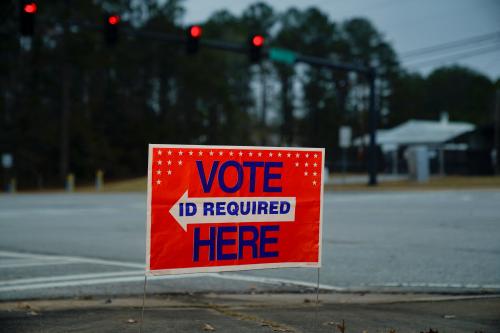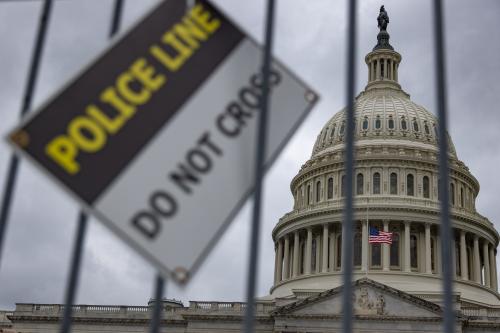According to the “prediction market” of Rasmussen polls, Barack Obama has an 87 percent chance of winning the presidential election. That’s a pretty high number, but if there were a prediction market in which people who’ve worked in counterterrorism would bet on the likelihood that we’ll soon be hearing from Osama Bin Laden, the number would almost certainly be even higher.
A surprise could be of the proverbial October variety, or it could come sometime after the election—perhaps within the six months that Joe Biden said would produce a major test of a President Obama. The record clearly shows that jihadists see the run-up to an election and the months just afterward as an opportune time to act.
Everyone remembers the Bin Laden video that was released days before the 2004 presidential election and the Madrid train-station bombings that occurred 72 hours before Spain’s national elections in March of that year. When the conservative government of José María Aznar mistakenly attributed the attacks to Basque separatists, the public punished his party, which was felt to be pretending that its unpopular support for the war in Iraq had nothing to do with the attacks. The socialists, led by José Luis Rodríguez Zapatero, had been trailing in the polls, but after the government’s blunder, they thumped the conservatives by a five-point margin.
Those are only the best-known jihadist interventions. Alongside them should be added the first bombing of the World Trade Center on Feb. 26, 1993, a little more than a month after Bill Clinton took office, and the attack on the USS Cole on Oct. 12, 2000, three weeks before that year’s Bush-Gore matchup. Last year, radicals attempted multiple car bombings in London and Glasgow, Scotland, three days after Gordon Brown’s June 27 installation as Britain’s prime minister. And let’s not forget the murder of Benazir Bhutto while she was campaigning in Pakistan or the September 2004 bombing of the Australian Embassy in Jakarta, Indonesia, which preceded the Australian elections by a month.
What makes elections and transitions so attractive to terrorists? After the October 2004 Bin Laden video was released, I wrote here about jihadists’ need to leave their fingerprints on big events. These are the seam moments, the points of inflection in history, and the terrorists want to demonstrate that they are central players in determining outcomes. They especially want to show their Muslim audience that they are having a powerful impact on the world stage and are the global actors they claim to be. Do they try to tilt events to help preferred candidates or parties? There isn’t much evidence to support that—and the terrorists seem to have some regard for the law of unintended consequences, so I don’t think they believe they can act with sufficient precision to ensure, for example, a victory for McCain or Obama. (The outcome of the 2004 Spanish election was a freak event; no one could have predicted that Aznar’s government would have botched its reaction to the bombings.)
That said, jihadist ideology does suggest that even though they despise all U.S. leaders, they know which leader would be better for their cause. There is a thick vein of Leninist thinking running through radical Islamism—Sayyid Qutb explicitly advocated the creation of a revolutionary vanguard of true believers. Another inheritance from Lenin was the notion that a hard-line enemy was better for mobilizing supporters than one who played down animus.
An appreciation for that kind of thinking underlies the argument Joseph Nye made in the Financial Times recently about why al-Qaida would prefer a belligerent McCain to an Obama who has spoken of improving America’s standing in the Muslim world and who “would do wonders to restore the soft power that the Bush administration has squandered over the past eight years. That is why Mr Obama is such a threat to Mr bin Laden.” Nye accepts the conventional wisdom that anything that turns the discussion to terrorism helps McCain, so in his view, al-Qaida has an extra incentive to act.
He may be right, though another possibility is that anything that reminds voters that Bin Laden is still out there might hurt the heir apparent to a Republican administration that hasn’t caught the world’s foremost fugitive. It’s also worth noting that terrorism is nothing like the concern it was for voters in 2004, when, as Paul Freedman pointed out, it was probably the decisive issue in George W. Bush’s victory over John Kerry. Of course, that could change. But today it would certainly take a lot more than video of the berobed Saudi to do the trick. (There remains a question about whether that tape made any difference in 2004—Kerry believed it did, but the number crunchers at Pew disputed that.) My Brookings Institution colleague and former CIA officer Bruce Riedel makes the interesting suggestion that we may be treated to one of the as-yet-unreleased martyrdom tapes of one of the Sept. 11 attackers. Ghoulish though that would be, it probably wouldn’t change many votes.
A video is the most likely piece of electioneering we will see from al-Qaida, but there are two other types of surprise that ought to be considered. The first, of course, is the reverse surprise. While McCain has objected to Obama talking about attacking Pakistani targets, that is precisely what the U.S. military has been doing for months now with helicopter gunship and Predator drone strikes on targets in the tribal areas. There is no reason to think that the United States has gotten the tip it’s been awaiting for the last seven years, but we also shouldn’t be surprised that so much of the firepower has been focused on the northern regions of the Federally Administered Tribal Areas, such as Bajaur, where Bin Laden was thought to be hiding. No doubt Bush would like nothing better than to finally settle that score—according to intelligence sources, there was a major push four years ago as well. Something tells me that the Saudi has figured this out, too.
The last possibility is the one really worth worrying about: a genuine terrorist attack, here or abroad, now or anytime after the election. It is purely speculative to suggest that the odds of an attack are increasing. Al-Qaida and other jihadists seem to be happily occupied, principally with destabilizing Pakistan and eroding security in Afghanistan. But a big trap has opened up, and one has to imagine that the terrorists will want to spring it. In short, there would be a high premium for them to carry out a significant attack soon, because in an election season, or in the early days of a new administration, there would be irresistible political pressure to carry out an obliterating retaliation. The target for that strike would be the terrorists’ safe haven in the FATA, and the result would be exactly the kind of widespread Muslim rage at the United States that the terrorists crave. Few today question that Osama Bin Laden ordered the 9/11 attacks because he wanted to draw the United States into a draining war in Afghanistan. To Bin Laden’s surprise, the quagmire scenario didn’t materialize there, but in Iraq.
With Pakistan already on the verge of a breakdown and anti-Americanism there sky-high, the attraction of igniting a chain of events like this must be tremendous for the jihadists. I’m not suggesting that we shouldn’t strike back if a major attack occurs; great nations don’t leave their dead unanswered, though it should go without saying that it’s as vital as ever to be discriminate when using force. Still, if the bomber gets through this time, the consequences are likely to be devastating.



Commentary
Op-edWhy Do Terrorists Love To Strike Around Elections?
October 22, 2008